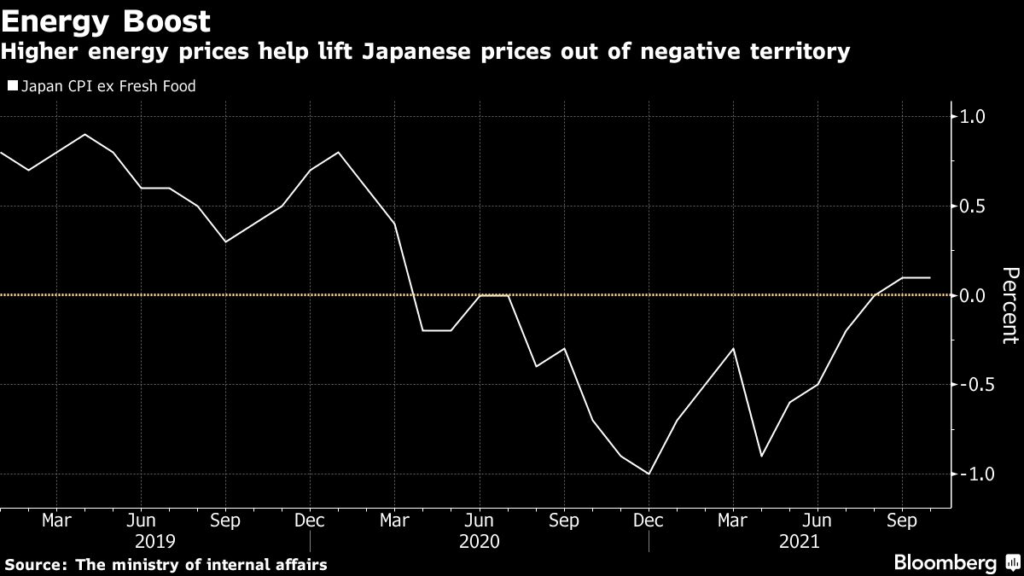(Bloomberg) — Higher energy costs caused Japanese consumer prices to edge up for a second month in October, with Prime Minister Fumio Kishida expected later Friday to deliver a stimulus package that includes countermeasures to ease the pain from more expensive fuel.
Consumer prices, excluding those for fresh food, increased 0.1% compared with a year earlier, maintaining September’s pace, the ministry of internal affairs reported. The result matched the median forecast from analysts.
While Japan’s price gains are far less dramatic than those confronting consumers and central banks elsewhere, surging oil costs have become an issue. Chief Cabinet Secretary Hirokazu Matsuno last week signaled the country’s new government would offer support to fishing and transport businesses coping with higher fuel bills as part of its first economic package. The overall size of the package will total about $690 billion, according to a draft of the plan seen by Bloomberg.
Japan’s Kishida Eyes Record Fiscal Power in Economic Stimulus
Falling fees for phone service, which have dropped this year under government pressure, continue to weigh on prices. The fees fell 54% from 2020’s level, shaving 1.5 percentage point from overall prices.
Meanwhile, gasoline prices have climbed in recent weeks to the highest level in seven years. That adds a burden on households especially outside Japan’s big cities, who tend to drive more and are an important constituency of the ruling party.
More details:
- Overall, consumer prices rose 0.1%. Analysts had expected an increase of 0.2%.
- Prices, excluding those for both fresh food and energy, declined 0.7%, matching the estimate
- Energy prices rose 11%, boosting the overall price index by 0.8 percentage point. Gasoline jumped 21%.
Soaring commodity prices amid supply chain bottlenecks and a weaker yen are also squeezing many Japanese businesses, which are facing the strongest cost pressure in four decades.
While most firms remain reluctant to pass their costs on to the country’s shoppers, who are known for being extremely sensitive to price increases after years of deflation and stagnant wages, there are some exceptions. Soy sauce maker Kikkoman Corp. last week announced a 10% hike on some products, citing higher costs for materials and logistics.
What Bloomberg Economics Says…
“We expect the core CPI gauge to increase 0.3% in November. Higher commodity prices and weaker yen are likely to push up prices of imported goods prices gradually.”
–Yuki Masujima, economist
To read the full report, click here.
Kishida’s aid package is aimed at putting the economy back on track after it shrank last quarter on a resurgence of Covid and a shortage of semiconductors. Measures will likely include cash handouts for children and tax breaks for companies raising pay.
Bank of Japan Governor Haruhiko Kuroda this week told local business leaders he sees core inflation increasing gradually to about 1% around the middle of next year. With no immediate prospect of reaching the bank’s 2% inflation target, though, he said the BOJ needs to stick with its easing, even as other central banks change direction.
(Adds detail on price moves.)
More stories like this are available on bloomberg.com
©2021 Bloomberg L.P.











